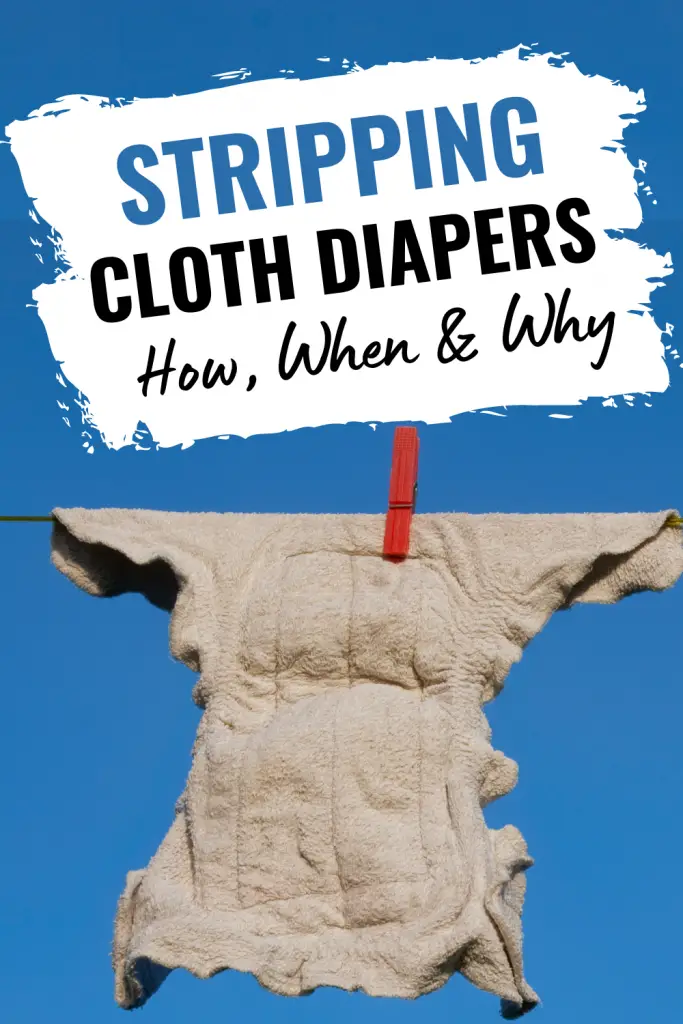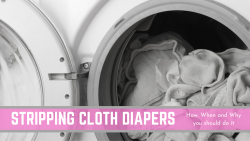If your cloth diapers are stinking, leaking, or repelling urine, you may need to strip wash them. It’s also a very good idea to do it before putting them away in storage for next baby. Stripping your cloth diapers will eliminate any buildup and make your cloth diapers smell like new again.
I only had to strip my cloth diapers once, because I was using the wrong amount of detergent and my daughter started getting bad rashes from detergent buildup. I remember I was so overwhelmed by all the different instructions on the internet on how to strip cloth diapers: it felt like every website had a different opinion and set of instructions on how to do it.
So, to make it easy for you, I am going to break it all down here. Below you will find information on when and why you should strip wash you cloth diapers, the different methods on how to do it, as well as tips to avoid having to strip wash your cloth diapers ever again moving forward.
Related:
- Reusable Diapers: a guide to Cloth and Swim Diapers
- 16 Tips and Ideas for Storing Baby Clothes (& Being Orgnanized!)
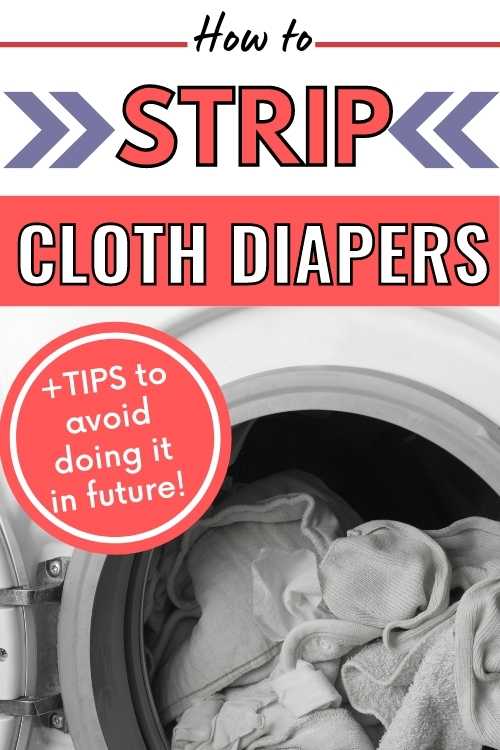
What Does it Mean to Strip Wash Cloth Diapers?
First of all, let’s make it clear on what it means to strip wash cloth diapers!
While lots of people think it consists in just a deep clean in hot water, stripping cloth diapers is a slightly more complex process aimed at removing buildup from your diapers.
It usually consists in detergent buildup or hard water minerals buildup. But it can also be from a lot of diaper cream that is not cloth-diaper friendly, or from fabric softeners if you are using them in wash cycles.
Why Strip Cloth Diapers?
The first obvious reason as to why you should be stripping cloth diapers is that if they are leaking, they will gain their functionality back (and stop leaking, thank god!).
The second, also obvious, reason is that they will stop being so smelly! There’s nothing worse than putting on an already stinky diaper on your baby. Or having to change them every hour just because you can’t stand that smell when you pick them up. I have been there … it’s horrible!
The other important (and maybe not so obvious) reason as to why you should strip wash your cloth diapers is that mineral or detergent buildup is usually responsible for trapping bacteria. This will cause rashes or burns on your baby’s skin.
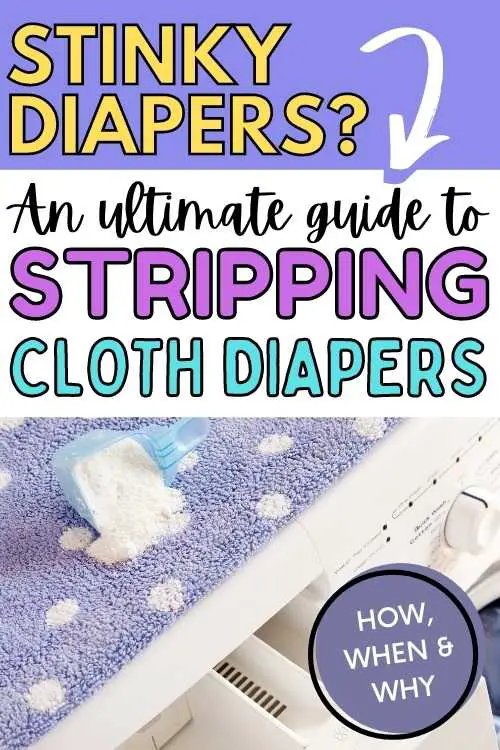
When to Strip Cloth Diapers
If your cloth diapers are smelly straight out of the wash, after drying, or as soon as your baby has peed in them, these are all signs that there’s a problem and you should strip wash them.
Also, if the cloth diapers are leaking, it could be another sign that you may need to strip them. In fact, build up reduces absorption! Make sure that the cloth diapers have a good fit and that they have enough absorbency first.
If the diaper or inserts are fully saturated, then you may just need more absorbency. If they are still dry in spots, they probably have buildup and need stripping.
You’ll also want to strip your diapers if you bought them second-hand. Don’t put pre-loved diapers on your baby without stripping them first! This is because you do not know how their previous owner washed them, the hardness of their water, or whether or not they used a cloth diaper friendly diaper cream.
Or what if the previous owner’s baby had a yeast infection and the yeast is still on the cloth diapers? Do you really want to risk a yeast infection on your baby?You really want to make sure your cloth diapers are as clean as new before you use them on your baby, and save yourself any trouble down the road.
Finally, it’s a good idea to strip cloth diapers before storing them away for your next baby. Packing cloth diapers away that still have build up, as mentioned above, can attract bacteria, and you don’t want lots of cloth diapers sitting with bacteria on them for years!
Note: you do not need to strip swim cloth diapers! These do not have any absorbency and don’t need to be stripped.
Related:
How Often Should I Strip Wash Diapers?
While some websites recommend strip washing your cloth diapers every so often, like once a month, I am of the idea that you should be doing it only if and when needed!
If you manage to nail the washing routine, and never experience issues, you may never need to strip your cloth diapers!
I don’t see why you should go through the effort if you are not experiencing any problem 🙂 But that’s just my opinion … if you prefer doing it every month or so, go for it.
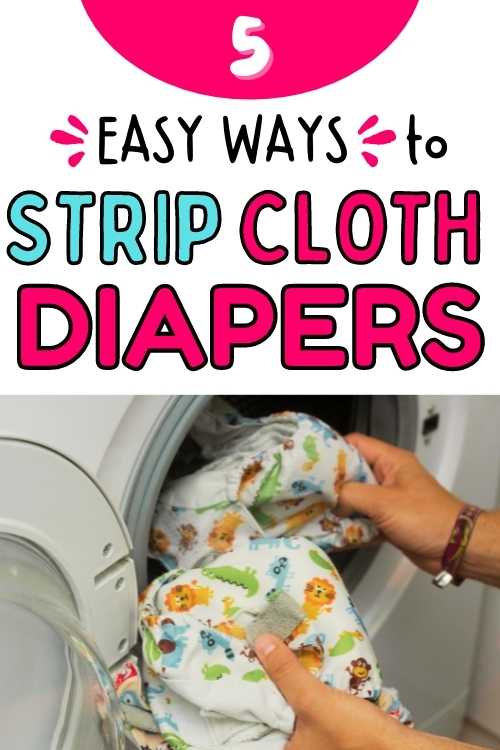
How to Strip Cloth Diapers
Right, so you’ve determined that you do have a problem and you need to strip wash your cloth diapers. But how do you do it?
While there are so many different opinions on how to strip cloth diapers out there, the ones listed below are usually recommended.
I have split them up depending on the cause of your problems: hard water, detergent buildup, or diaper cream buildup, plus a DIY recipe. If you are unsure of which method to use, try the hot wash recommended for the detergent buildup first. If that doesn’t help, try GroVia Mighty Bubbles or RLR, then the dish washing liquid. You can safely use GroVia Mighty Bubbles or RLR in any soft water as well, they may just require additional rinses.
The one golden rule that is common to all the different methods is that the diapers need to be clean when you start the stripping. You do not want the stripping agent to have to work on anything other than the buildup.
And remember you do not need to strip covers if you are using hybrid, flats or prefold diapers, only the part of the diaper that is absorbent.
1) Hard Water Minerals Buildup
If your stinky or leaky diapers are due to a buildup of hard water minerals, you can strip your cloth diapers with either Grovia Mighty Bubbles or RLR. Both methods are equally effective.
However, remember that you do need to fix your problem with hard water after you’ve stripped your diapers! Otherwise the buildup is going to happen over and over again, and you will end up stripping until your baby is out of cloth diapers 🙂
The solution is usually to add a bit of Calgon or Borax to your wash routine, as these are the most accessible and effective water softeners with hard water. For more information on hard water and cloth diapers, including how to test if you do have hard water, check this article here.
Also remember that you can safely use GroVia Mighty Bubbles or RLR in soft water as well, it may just require additional rinses.
1.1) Stripping Diapers with GroVia Mighty Bubbles
GroVia Mighty Bubbles was designed specifically to remove buildup in cloth diapers and seems to be people’s first choice.
To use GroVia Mighty Bubbles to strip your diapers, do the following:
- Use one pod per 24 diapers you have. Each diaper includes the cover, inserts, prefold, or flats. If you have more than 24 diapers, repeat the process with the next load.
- Use the heaviest wash cycle you have on hot and wash your diapers with one Mighty Bubbles pod. Do not add detergent or other additives.
- Do a warm or hot rinse.
- Once the rinse is done, check to see if your diapers still smell. If they do, repeat the strip cycle up to two or even three times.
There is no need to soak with GroVia Mighty Bubbles!
1.2) Stripping Cloth Diapers with RLR
RLR is another one of the favorite options for stripping cloth diapers when dealing with hard water.
To strip your diapers with RLR, do the following:
- Use one packet of RLR per large load (approx. 30 diapers).
- Add the RLR and a very small amount of the detergent to the washing machine.
- Wash on the longest, heavy duty, hot wash cycle available.
- If there are suds remaining after final rinse, run one additional rinse or short wash cycle.
2) Oil / Diaper Cream Buildup
If you are using lots of diaper cream with no diaper liner, this will end up building up in your cloth diapers, and the method below is perfect for removing it. I have personally used this method with my cloth diapers and it worked very well.
Because detergent or hard water minerals buildups often cause rashes, parents often end up using a lot of diaper cream when they already have buildup problems. It’s like buildup on buildup!
2.1) Stripping Diapers with Dish Washing Liquid
- Get about a teaspoon of dish washing liquid (with no hand moisturizers) and spread it across the inside of the diaper.
- Leave it to sit on the diaper for about 10 – 15 mins.
- Rinse it under warm water.
- Put it through a hot wash without any detergent.
Never put dish washing liquid in your washing machine! This can cause serious issues with your machine and can actually void your warranty. Just strip your diapers in the sink or the bathtub.
Blue Dawn is a great choice of dish washing liquid as it has a low amount of additional fragrances or additives.
3) Detergent Buildup
If you are experiencing problems with stinky or leaky diapers and you do not have hard water, nor you use a lot of diaper cream, then the issue is often detergent buildup.
In this case, you can just use the method below with hot water. The hot water with a wash cycle that agitates any buildup off the diapers should be enough to solve the problem.
3.1) Stripping Cloth Diapers with Hot Water
To strip your cloth diapers with hot water, do the following:
- Put your cloth diapers through a hot wash with no detergents or additives, and rinse.
- If you see suds during or after the wash cycle, do another hot wash and rinse.
- Continue until most suds are gone.
- If you can’t see any suds inside, then do at least 2 hot washes.
If you only have a small amount of diapers that need stripping, you can also just run them under hot water in your sink or bath tub, and repetitively squeeze the water out of the inert or diaper.
4) DIY Stripping Recipe
This is another method that is often shown in many websites and recommended by people. It is a very cheap DIY solution, so it could be perfect if you are on a tight budget.
- Place 3 tablespoons each of washing soda, Borax, and Calgon into your washing machine.
- Wash on the longest, heavy duty, hot wash cycle available.
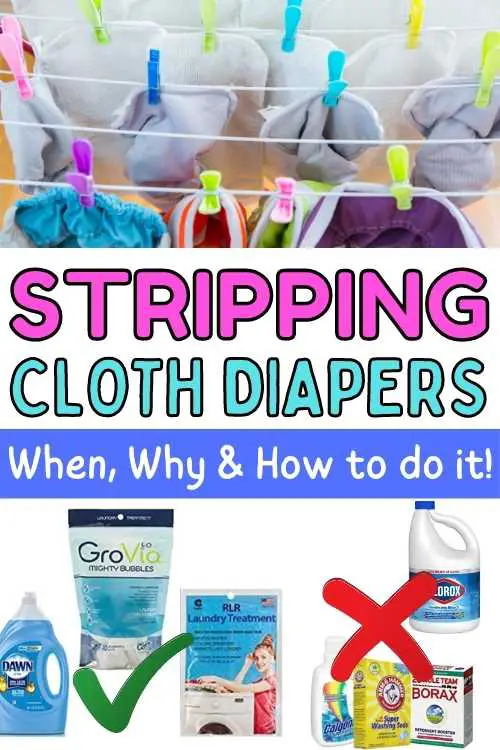
What NOT to Use to Strip Cloth Diapers
Even though you might come across these stripping / sanitizing methods online, be careful and stay away from them!
Here’s what you should NOT be using to strip cloth diapers:
- Bleach: do not use bleach or any other hash stain removers, particularly on natural fabrics. It will shorten the lifespan of your diapers (especially the elastic) and will void most warranties.
- Boiling Water: if you are worried about bacteria, do not use boil water. Instead, leave your diapers in bright sunlight and the UV rays from the sun will kill any bacteria.
- Bicarbonate of Soda and Vinegar: while many websites recommend these, make sure not to use them with bamboo diapers, as they will dissolve the bamboo fibers.
Tips to Prevent Buildup and Avoid Having to Strip Cloth Diapers
Why spend all this time stripping cloth diapers, when you could avoid doing it all together? In fact, if you can nail the washing routine and avoid buildup of any kind, you do not need to strip cloth diapers at all.
Here’s some good tips that will help you prevent build up and avoid stripping.
Related: Top Tips on How to Wash Cloth Diapers
1. Use the right amount of detergent
When washing cloth diapers, don’t use too little detergent, nor too much. If you add too much detergent, the wash cycle will not have a chance to get it all out. So, it builds up in the diaper and can make it stink. If you don’t use enough, you risk not getting the diapers clean enough.
Make sure to follow the manufacturer’s recommendations with regards to the amount of detergent to be used.
2. Use a water softener if you have hard water
The solution to hard water is using a water softener to combat the build up of minerals. Powdered detergents generally contain more built-in water softeners than liquid ones. However, in hard water, even those built-in softeners aren’t often enough.
Add a bit of Calgon or Borax to your wash routine, as these are the most accessible and effective water softeners with hard water.
3. Do not use a fabric softener
Fabric softeners coat your diapers’ fabrics and reduce absorbency, so avoid using them when washing any type of cloth diapers.
4. Use a diaper liner
If you need to use a diaper cream, either use a diaper-friendly one, or use a liner between baby’s skin and the diaper. The liner will prevent the diaper cream from building up on the diaper.
Check here for a list of cloth diapers safe rash creams.
Summary
So that’s a run-through of all the different methods I’ve tried to strip cloth diapers plus tips to avoid having to do it in the future. I really hope the information above helped you understand what stripping method you should be using for your cloth diapers to make them like new again.
And remember that the trick to avoid having to strip diapers ever again in the future is to have a good washing routine. Otherwise you will periodically find yourself dealing with bad small or leaky diapers.
For more information and tips with regards to cloth diapers, also check out these related articles:
- Top 10 Tips on How to Wash Cloth Diapers
- 17 Genius Cloth Diapers Storage Ideas
- Reusable Diapers: a guide to Cloth and Swim Diapers
- How to Use Reusable Swim Diapers (The Ultimate Guide!)
- The different types of Cloth Diapers: How do I choose the right one?
- The 6 Best Fitted Cloth Diapers
What about you? Have you ever had to strip your cloth diapers? Or did you try another effective method that is not listed above? If so, please let me know in the comments below – I’d love to hear from you!
Did you find this useful? Pin It!
